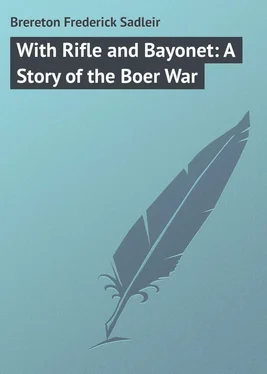Frederick Brereton - With Rifle and Bayonet - A Story of the Boer War
Здесь есть возможность читать онлайн «Frederick Brereton - With Rifle and Bayonet - A Story of the Boer War» — ознакомительный отрывок электронной книги совершенно бесплатно, а после прочтения отрывка купить полную версию. В некоторых случаях можно слушать аудио, скачать через торрент в формате fb2 и присутствует краткое содержание. Жанр: foreign_prose, foreign_children, на английском языке. Описание произведения, (предисловие) а так же отзывы посетителей доступны на портале библиотеки ЛибКат.
- Название:With Rifle and Bayonet: A Story of the Boer War
- Автор:
- Жанр:
- Год:неизвестен
- ISBN:нет данных
- Рейтинг книги:5 / 5. Голосов: 1
-
Избранное:Добавить в избранное
- Отзывы:
-
Ваша оценка:
- 100
- 1
- 2
- 3
- 4
- 5
With Rifle and Bayonet: A Story of the Boer War: краткое содержание, описание и аннотация
Предлагаем к чтению аннотацию, описание, краткое содержание или предисловие (зависит от того, что написал сам автор книги «With Rifle and Bayonet: A Story of the Boer War»). Если вы не нашли необходимую информацию о книге — напишите в комментариях, мы постараемся отыскать её.
With Rifle and Bayonet: A Story of the Boer War — читать онлайн ознакомительный отрывок
Ниже представлен текст книги, разбитый по страницам. Система сохранения места последней прочитанной страницы, позволяет с удобством читать онлайн бесплатно книгу «With Rifle and Bayonet: A Story of the Boer War», без необходимости каждый раз заново искать на чём Вы остановились. Поставьте закладку, и сможете в любой момент перейти на страницу, на которой закончили чтение.
Интервал:
Закладка:
“Then the British immigrant arrived and sat down by the side of the Boers, and together, in perfect unity and good fellowship, they pushed farther into the country, fighting one long continuous fight against hordes of natives and against lions and other savage beasts. Every step they advanced had to be fought for; for, just as the Bed Indians in America have persistently resisted the onflow of strangers into their hunting-grounds, so have the natives of South Africa fought to resist the onward progress and invasion of the white settlers into the land which they considered theirs by right of birth.
“But now – to hark back for one moment to that time when England stepped in and took possession of the colony – a factor arose to upset the peace and general agreement of Boer and Briton. The fact that they had been handed over by their own government to the British, like so many sheep, had roused the fiercest anger amongst the Boers. And now this resentment was inflamed by the restraining hand which our government laid upon them with regard to the natives.
“Years before, the Boer settlers had become accustomed to slave labour, and as they pushed on into the country, natives were pressed into their service. And these they had punished as each man considered the case deserved. Probably because there was a plentiful supply of Kafirs and Hottentots our Boer friends had not stopped at whipping the poor fellows. They treated them with absolute brutality, even going to the length of taking their lives.
“Such barbarous doings awoke in England a storm of anger, for, thank God, our country has long been opposed to slavery. Freedom and equality has been our motto for many years, and we have sustained it at no small cost to ourselves.
“When the tales of Boer brutality became known to the folks at home, the indignation it caused resulted in the emancipation of all slaves, and from that date the ‘Baas’, as the master is called, and the native ‘boy’ had equal rights; and to injure one of them was a crime punishable by the same laws as hold good in England.
“You can imagine, my lads, what rage this new arrangement caused in the hearts of the Boers. For years they had been free to do as they chose, and now their slaves were theirs no longer, and the natives, who had been in their masters’ eyes like mere cattle, were now their equals in point of law, and were not to be ill-treated with impunity.
“This was too much for the Dutchmen. The very sight of an Englishman roused their anger and hate, and rather than be forced to live side by side with them and be governed by their laws, they struck out a line for themselves and trekked away north into the unexplored wilds. Taking their wives and children with them, and driving their flocks, they set out for the unknown, seeking isolation from the British, and a country they could call their own.
“Thousands joined in what is known as the ‘Great Trek of 1837’. Some of the more daring of them pushed on as far as the Vaal River, which, of course you know, is the southern boundary of the Transvaal, or South African Republic, as it is called nowadays. They paid dearly for their temerity, for the Zulus came down in swarms against them and massacred every one of them. But the staunch Boer, with his dogged pluck, in which he much resembles our countrymen, was not the man to be deterred by first failures. He pressed on, but in greater numbers and with more caution, and when the Zulus attacked again, beat them off and drove them out of the neighbouring country.
“Others of the Trekkers settled on the Zand River, in what is now the Orange Free State, while others pushed across the veldt, and finally crossed the passes of the Drakenberg Mountains and came to a halt in Natal.
“But these last were also to meet with trouble from the Zulus, for whilst their leaders were bargaining with Dingaan, the chief of that fierce native tribe, they were fallen upon with barbarous ferocity and slaughtered to a man.
“Well, you have often heard it said that when the black man sees blood, no power on earth can keep him in check. That was what happened now. The fierce Zulu warriors had dipped their assagais in the blood of their white foes, and they were not to be held back. Like a wave they burst over the smiling landscape of Natal, and when the tide had ebbed hundreds of hapless men and women had been sent to their last account.
“That was the commencement of all the bitter hate which the Boer of the present day has for the native race.
“I think you have seen, my lads,” proceeded Mr Hunter, “that dogged stubbornness of purpose and undoubted pluck were characteristics of that old Boer people. They never knew when they were beaten, and no amount of danger and hardship would prevent them from pushing on for that promised land which was to be theirs alone, and where they might live in freedom and solitude, with no thought for to-morrow, and with no cares to upset the calm and peace of the life for which they longed.
“They banded themselves together and marched against the treacherous Dingaan, only to be beaten. But again they gathered their forces under the leadership of Andries Pretorius, and on December 16th, 1838, gave the Zulus a tremendous thrashing, killing three thousand of them.
“Then, having settled the natives, they built their farms and appointed from their number certain men who were to form the Volksraad or parliament of their new possessions. But again the British stepped in and intimated that they would not allow an independent state to be formed in the colony. The Boers resisted, and hoisted their flag, but reinforcements were sent up-country, and in May, 1842, the whole of Natal was taken over as a British colony.
“Now, had these hardy pioneers cared to live under British rule, they were free to stay on their farms in Natal. But hatred of all things English was as prominent in their hearts as their enmity for the natives. Britons should not rule them, they swore; nothing but absolute independence would suit them, and so once more they trekked away and joined their brothers on the Zand River.
“One really admires the persistence and pluck of those brave fellows. To an Englishman freedom and independence is a birthright for which he is ever ready to give his life, and to these uneducated Boers interference of any sort was detestable. Brought up in a strictly religious way, the Bible was the only book they ever cared to read. They had no ambition, no wish to rise in the world, and no desire for riches. Give each one a wife and children and a farm right away on the lonely veldt, where he could ride for miles on miles with his gun across his shoulder and never see a house or man, then he was happy. He was independent, could go and come as he liked, and had no cares and worries to destroy his happiness. It was not much to ask for, and had he but acted as our countrymen have always done, his simple, pastoral existence would never have been disturbed. But again ill-treatment of the natives roused the ire of the British Government, and the Queen’s authority was asserted over the whole of the Orange Free State.
“It always strikes me as remarkable that men so devoutly inclined, whose honour and integrity were in those days characteristic of them, and whose private lives were almost always so upright and correct, should still forget that after all a native is but one of God’s creatures, placed in this world to live in happiness. But they could not realise it. The Bible spoke of slavery, and that was good enough for them.
“Well, my boys, we now come to the last trek. England took over the Orange Free State, and the Boers only gave it up after a stern conflict at Boomplaats, in which they were beaten. With Pretorius, their leader, they took their wagons and horses, and pushed on in a northerly direction till they were beyond the 25th degree south latitude. Here they settled once more, and those hardy pioneers, amongst whom I believe was President Kruger, are the oldest white inhabitants of this the South African Republic. At last they were in a country all their own. They chose the members of their Volksraad, and promptly scattered to lay out their farms, and commence that life of simple ease for which their hearts had longed.
Читать дальшеИнтервал:
Закладка:
Похожие книги на «With Rifle and Bayonet: A Story of the Boer War»
Представляем Вашему вниманию похожие книги на «With Rifle and Bayonet: A Story of the Boer War» списком для выбора. Мы отобрали схожую по названию и смыслу литературу в надежде предоставить читателям больше вариантов отыскать новые, интересные, ещё непрочитанные произведения.
Обсуждение, отзывы о книге «With Rifle and Bayonet: A Story of the Boer War» и просто собственные мнения читателей. Оставьте ваши комментарии, напишите, что Вы думаете о произведении, его смысле или главных героях. Укажите что конкретно понравилось, а что нет, и почему Вы так считаете.












